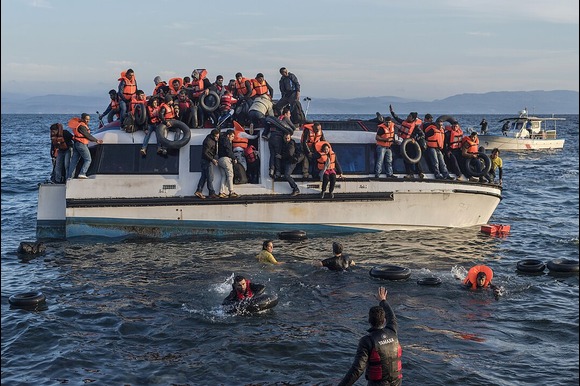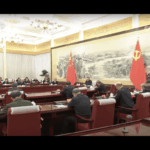The UK government is set to unveil a sweeping package of sanctions targeting international people-smuggling networks, including gang leaders, corrupt officials, complicit police officers, fake passport dealers, and companies involved in the supply of small boats used in illegal Channel crossings.
These unprecedented measures, expected to be announced on Wednesday, form a cornerstone of Prime Minister Sir Keir Starmer’s strategy to address the surge in small boat arrivals by dismantling the transnational criminal operations behind them.
Dozens of individuals and entities are anticipated to face sanctions, including asset freezes, travel bans, and restrictions on engaging with the UK’s financial institutions. The move comes as mounting political and public pressure pushes the government to find effective solutions to halt illegal migration across the English Channel.
Sir Keir has made it a central policy objective to “smash” people-smuggling gangs, highlighting the issue as a top priority during last year’s general election campaign.
Foreign Secretary David Lammy described the initiative as a “world-first” sanctions regime, calling it a vital move to break the global networks facilitating human trafficking. Speaking on BBC Radio 4’s Today programme, he said: “We are leading, others will follow,” stressing that the plan marks an end to the “status quo,” which has allowed criminal gangs to exploit vulnerable migrants without consequence.
The scope of the sanctions will extend beyond criminal ringleaders to enablers, such as financial intermediaries who channel funds through informal money transfer systems like Hawala—commonly used by smugglers to finance operations while evading traditional banking scrutiny.
According to recent data from the Home Office, more than 20,000 people have crossed the Channel in small boats in the first half of this year alone—an increase of nearly 50% compared to the same period last year.
However, some experts have questioned the likely effectiveness of the sanctions in curbing the broader smuggling industry. Dr Madeleine Sumption, deputy chair of the Migration Advisory Committee, told the Today programme that she would be “surprised” if the measures proved a “game changer” in eliminating the small boats route altogether.
“There are so many people involved in the industry that targeting people individually is probably only going to have an impact around the margins,” she said, noting that successful enforcement would also depend heavily on cooperation from foreign governments where many smugglers operate.
Enver Solomon, CEO of the Refugee Council, welcomed the potential to disrupt trafficking networks but warned that enforcement measures alone were unlikely to stop dangerous crossings. “Sanctions may help disrupt some of the criminal networks profiting from human misery,” he said, “but enforcement alone will not stop dangerous Channel crossings without providing safe alternatives for those seeking asylum.”
In Parliament on Monday, shadow home secretary Chris Philp described illegal migration as a “public safety crisis” for women and girls. During an urgent question in the Commons, he dismissed the planned sanctions as insufficient, saying: “The truth is you don’t stop the Channel crossings by freezing a few bank accounts in Baghdad or slapping a travel ban on a dinghy dealer in Damascus.”
The government insists that the sanctions are designed to tackle immigration crime where conventional policing and justice systems fall short. Home Secretary Yvette Cooper stated the regime represented a “decisive step” in the UK’s mission to combat human smuggling.
“This new sanctions framework will allow us to target the assets and operations of people-smugglers wherever they operate, cutting off their funding and dismantling their networks piece by piece,” she said.
Earlier this month, the UK signed a new “one in, one out” bilateral agreement with France, which allows for the return of migrants to France in exchange for accepting a corresponding number of vetted asylum seekers through legal routes.
The announcement also comes against the backdrop of rising tensions within the UK. Over the weekend, unrest broke out in Essex during a protest outside a hotel housing asylum seekers. The demonstration followed the arrest and charging of an asylum seeker in connection with alleged sexual assaults. Police described the protest as having devolved into “mindless thuggery,” with officers targeted by flares and bottles.
Reform UK leader Nigel Farage defended the protestors, characterizing them as “genuinely concerned families” and warning that parts of the country are nearing “civil disobedience on a vast scale.”
The government maintains that its new sanctions regime is a critical component in a broader strategy to stem the tide of illegal migration and restore order to the UK’s border system, while also reaffirming its commitment to dismantling the financial and logistical infrastructure of people-smuggling networks worldwide.






